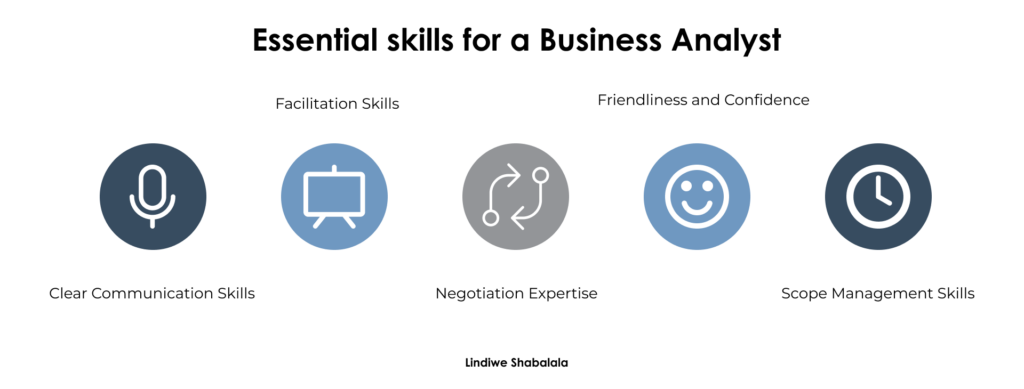Media
My Journey from Newbie to Seasoned Pro as a Business Analyst

Lindiwe Tshabalala started her career around 14 years ago in 2009, where she started at Absa in a Graduate Program for a Branch Manager role in retail for 1 year, she was then taken into permanent branch as a branch manager for 6 months, before she was moved into corporate business banking as Project Administrator for around 6 months, which after was moved over to a Junior Business Analyst, and since then she has been a Business Analyst. She studied at the University of Free State where she obtained a BCom in Banking, and whilst she was a Junior Business Analyst, she studied towards her Diploma in Business Analysis from FTI. Lindiwe is currently working for CyberPro Consulting where she consults at Afrocentric Tech as a Senior Business Analyst.
Expectations versus reality of being a Business Analyst
At the start of my career, my manager, who also served as my mentor, moved me to the role of Junior Business Analyst. Observing her as a Lead Business Analyst sparked excitement, as her work seemed dynamic and engaging. The art of asking incisive questions during requirement sessions and meticulously documenting the gathered information appeared fascinating.
However, the initial allure faded as I transitioned into active participation. The reality was more demanding than my mentor had made it seem. Crafting effective probing questions proved to be a skill that required refinement, as I often found myself uncertain about the right queries to pose or received closed-ended responses.
For an introvert like me, the challenges extended beyond the technicalities of the role. The need to step into a leadership role, have my voice heard, and guide others demanded a departure from my comfort zone. Overcoming my inclination toward introversion became vitally important in building trust with stakeholders. A piece of advice from my manager stuck with me – never leave a meeting without asking a question, no matter how simple. Being memorable in a professional setting meant making a mark, ensuring people could trust me with their business.
Conversely, for extroverts, finding balance is key. While an extroverted nature aids in communication, it’s essential not to overshadow stakeholders. Actively listening and staying aligned with stakeholder expectations are paramount. Collaboration, not domination, is often the preferred approach.
Bridging the gap between expectations and reality is an ongoing process. Introverts need to learn to make their presence know, while extroverts need to refine the art of measured communication. Success in this role hinges on striking the delicate balance between speaking and listening, leaving an indelible mark without overshadowing the collaborative essence of the profession.
Applying theoretical knowledge to practical scenarios
Real-world scenarios can often resemble a puzzle – you have an idea of what you want, but the information is scattered, and chaos lurks. When this happens, my go-to move is to lead it back to theory. Creating a structure, a plan that I can follow and revert to. I start by jotting down a plan, a roadmap of what needs to happen. For instance, if it’s a facilitation workshop, I outline my objectives – what I aim to achieve. Then the questions begin, where I ask myself: What artifact needs to be developed from this workshop? Is another workshop needed? Are there gaps in our understanding? It’s a mental checklist that keeps the process structured and purposeful.
Here’s my secret weapon – BA 101. It’s my way of reminding myself to go back to basics. My advantage in the beginning of my career was working and studying simultaneously – you learn from the book, and then you’re implement that knowledge into the practical field. Applying theoretical knowledge becomes second nature. The essence is in connecting the dots between theory and practice, that transforms chaos into clarity. It’s not just about knowing what you want; it’s about having the structured approach to get there. So, whether it’s a workshop or any practical scenario, the art lies in weaving theory into a tangible plan that guides the way forward.
Essential skills and knowledge areas for a Business Analyst
Being a Business Analyst, you need to hone a set of essential skills and acquiring in-depth knowledge is paramount for success. The following skills is among the key skills that you would require to be an exceptional Business Analyst:

Clear Communication:
Effective communication is the linchpin of a successful business analyst. Imagine explaining concepts as if you’re talking to a 2-year-old; this simplicity ensures that your message resonates with stakeholders, be they from the business or technical departments. Tailoring your communication to the level of your audience is a skill that sets great business analysts apart.
Facilitation Skills:
Running a workshop is an art, and business analysts must master it. From coordinating effective discussions to extracting crucial information, knowing how to navigate a workshop is crucial. This skill extends to adeptly preparing documentation, ensuring that insights gathered are translated into actionable plans.
Negotiation Expertise:
Stakeholders often have specific requirements, but understanding the balance between cost, value, and business needs is where a business analyst shines. Negotiating timelines, managing scope creep, and aligning business goals with project possibilities are all part of the delicate negotiation process.
Friendly Personality and Confidence:
Building relationships is as vital as analysing data. Cultivating a friendly personality and exuding confidence not only advances trust among stakeholders but also enhances your effectiveness as a business analyst. With experience, you naturally become more confident, a trait that evolves as you navigate through various projects.
Scope Management:
The ability to control and manage project scope is a critical skill. Anticipating potential delays, wrapping up scope before project initiation, and skillfully negotiating when stakeholders wish to expand the scope are all part of a business analyst’s duties. Being in control of the scope ensures that projects stay on track and deliver optimal results.
Mastering these skills will not only propel your career but also solidify your reputation as a proficient and reliable professional.
Challenges faced in my career and how I overcame them
I worked on a project in Kenya which marked a fundamental moment in my career as I transitioned from the familiar territory of waterfall methodology to the agile methodology. As the Lead Business Analyst, adapting to Agile, with its SCRUM principles and the task of crafting user stories, presented a challenge as I was unfamiliar with the methodology. Adapting to the Agile methodology was not just about mastering a new set of procedures; it was about embracing a fundamentally different approach to projects. The transition demanded a shift in my mindset.
To overcome this challenge, I took a proactive stance where I delved into thorough research. This period of intensive research served as a foundation for my subsequent projects.
Realizing the value of collective wisdom, I sought guidance from experienced Business Analysts who had successfully navigated Agile projects. I invited these colleagues to meetings, invited their insights, and asked for reviews of documentation. This approach not only expedited my learning curve but also promoted a supportive professional network.
The project itself operated on Jira and Confluence. Developing proficiency in these platforms became essential. I invested time in learning the ins and outs of these tools as I recognized their role in this Agile project.
Reflecting on this experience, my advice to younger Business Analysts is straightforward: embrace a proactive approach to learning. Never assume you know everything; instead, research extensively, question assumptions, and seek assistance when needed. The field of business analysis is dynamic, and continuous learning is not just a professional requirement but a pathway to overcoming challenges and thriving in diverse environments.
One factor also shaped me in my career growth was encountering situations where stakeholders expressed dissatisfaction. This experience instilled in me the confidence to articulate and defend my decisions. The presence of questions and disagreements, rather than hindering progress, indicates forward movement in my view. My confidence stems from the realization that reactions, whether positive or negative, signify engagement. A lack of questions doesn’t necessarily imply proficient job performance; it might instead suggest a failure to grasp or address the right issues. Embracing questions and disagreements means gaining more insights and answers. In essence, if no one challenges what you’re doing, it’s a sign that something may be amiss in your approach.
Advice to aspiring Business Analysts
I am part of a community of Business Analysts that convenes quarterly, providing an opportunity for us to exchange experiences and stay informed about the latest developments in our field. During these gatherings, we share insights and lessons learned. Additionally, I keep myself updated by actively reading about new trends and advancements in business analysis.
This community serves as an excellent platform for staying current in my profession. It’s inclusive, welcoming anyone aspiring to become a Business Analyst. This openness encourages knowledge-sharing and contributes to the growth of individuals aspiring to excel in the field of business analysis.
In any assigned project, I strongly recommend that every Business Analyst delves deep into understanding the business, encompassing its architecture, systems, business value, and strategy. A comprehensive grasp of the business, from inception to conclusion, is essential. This knowledge ensures a clear understanding of the project’s impact on the business, the systems it interacts with, and the overall functioning of the organization.
In the context of conflict, it’s crucial to recognize that differing perspectives don’t necessarily indicate wrongdoing. Instead, they often signify a shared passion for the project. In these situations, the focus should shift towards bridging the gap in understanding. Conflict becomes an opportunity for collaboration, as both parties work towards a common understanding and resolution.
When I embarked on my journey, I underestimated the significance of the Business Analyst role, only to realize its pivotal nature over time. The success of a project hinges on the crucial functions you perform. Your role extends beyond what may be immediately apparent – ensuring the solution aligns with the business and preventing developers from inadvertently disrupting the system. Nothing gets signed off without the consultation of a BA, and no meeting can proceed smoothly without your presence. You are the linchpin of a project, holding it together until it reaches production.
In managing multiple projects, transparency is key. I communicate openly about how much time I can dedicate to each project, emphasizing the importance of effective time management for a Business Analyst. To navigate diverse projects successfully, a comprehensive understanding of the business from start to finish is essential. This knowledge facilitates the necessary split in focus between projects.
Persistence and perseverance are indispensable qualities in this role. The reality may not always match expectations, but giving up is not an option. Resilience and adaptability to change are crucial – being quick to adjust to new circumstances. Listening is a paramount skill in Business Analysis; being attentive to others’ perspectives enhances collaboration and problem-solving. In essence, the journey as a Business Analyst demands continuous learning, resilience, adaptability, and effective communication.
Services
Do you have any questions or queries?
We can help you grow your business

Driven by a commitment to client satisfaction, collaboration, and cutting-edge solutions.
Years Experience

Delivering excellence through decades of expertise, innovation, and trusted solutions.
